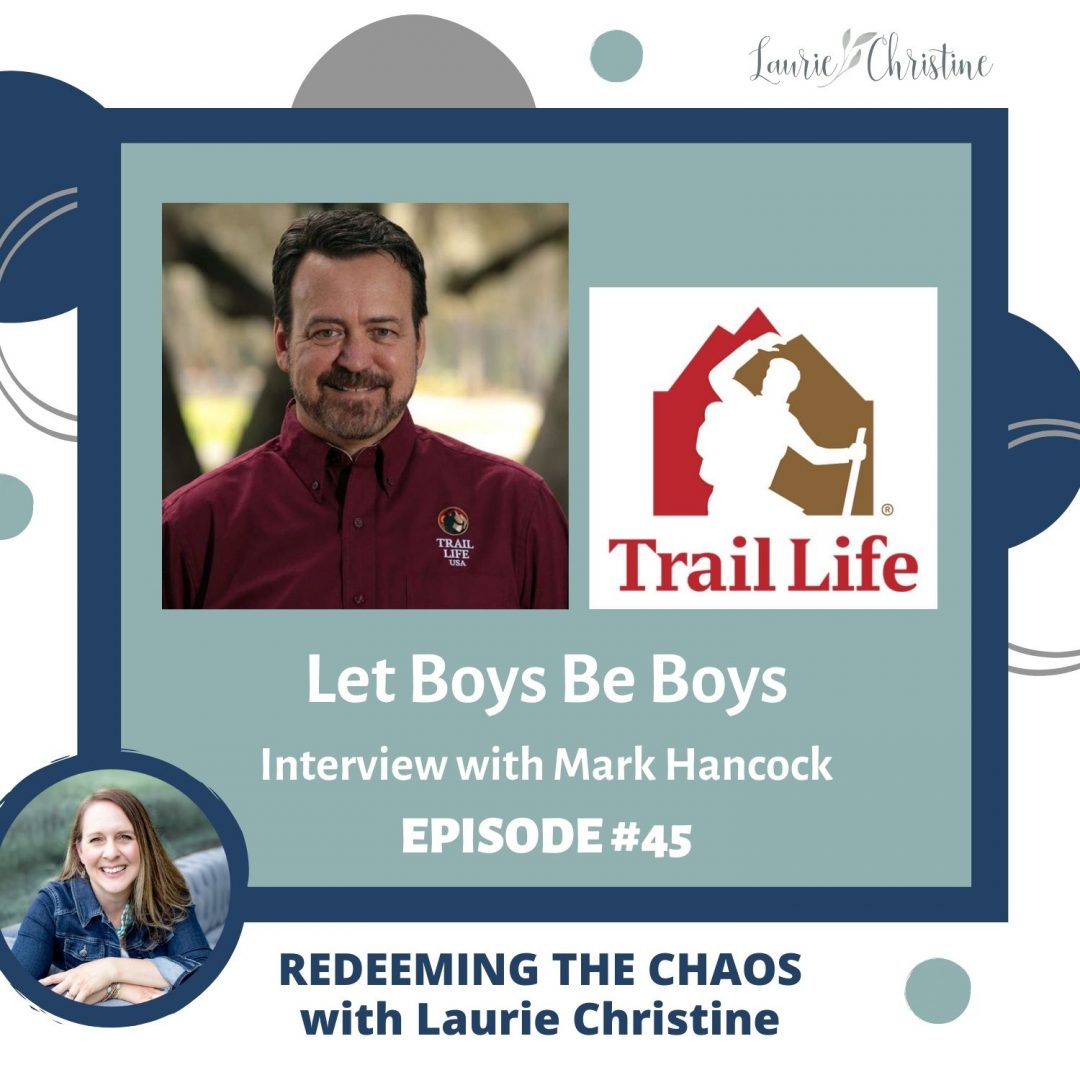Redeeming the Chaos

Let Boys Be Boys -- with Mark Hancock

I am sure you have heard the phrase, “Let boys be boys,” or “He is all boy.” But have you ever stopped to think about what that even means? And is it a good thing? Our culture today seems to be on a mission to stamp out everything boyish about our little boys, but what can we do about it? How can we let our boys be the boys that God has designed them to be?
We have a special guest on the show today who is going to help us answer these questions.
WELCOME TO EPISODE 46 OF REDEEMING THE CHAOS.
(This post contains affiliate links).
Mark Hancock is an award-winning writer, conference speaker, and the CEO of Trail Life USA, a national organization whose mission is to guide generations of courageous young men to honor God, lead with integrity, serve others, and experience outdoor adventure.
Mark holds degrees in mental health counseling and has spent several years in private practice as well as many years serving in pastoral roles. He is the author of the book Why Are We Sitting Here Until We Die? As well as two booklets: Let Boys Be Boys – Three Winning Strategies for Leaders of Boys and Five Critical Needs of Boys.
He has two sons of his own, and he is a leading expert on raising boys to be courageous, godly men. Mark Hancock, welcome to redeeming the chaos.

Interview with Mark Hancock, CEO Trail Life USA
Listen to the interview here:
Since this is a rather lengthy interview, I’m including links to the main topics below. Click the link to jump to that section:
- How does culture impact our boys?
- How boys and girls are different
- Why boys love video games
- How to help your boy control his emotions
- Why your son needs to fail
- Why your son needs a Trail Life troop
- The four biggest problems our boys face in society today
- Why the outdoors is the best place to connect with your son
- Why men need connections with other men
- How to connect with your son’s heart
- How to get involved with Trail Life USA
- Booklet: Let Boys Be Boys
- Tips for moms
- Tips for dads
- How well do you know your son?
We are excited to jump into our topic today – How we can let our boys be boys, and how we as moms can encourage our sons to be the boys God designed them to be.
And then we are going to talk a little bit more about Mark’s organization, Trail Life USA, and the importance that dads play in our boys’ lives. So this would be a great episode to share with your husband, or your son’s dad, or a grandfather or male leaders at your church. So I would encourage you to share this episode with them.
How Does Culture Impact Our Boys

Laurie:
So, Mark, I just want to talk a little bit about the state of our culture today. What are some of the messages that our culture is sending us about our boys and how are those messages negatively impacting our sons?
Mark:
Oh, wow. What a great question. I loved your introduction. It seems like in our culture today, boyhood itself is some sort of social disease that we’re trying to eradicate. It’s like there’s something wrong with boyhood today. It’s really sad.
Boys are now twice as likely to be in special education classes and three times more likely to have ADHD. They have fallen behind girls in every single academic category. There are now more girls going to college, getting master’s degrees and doctoral degrees than there are boys. That statistic has totally flipped over the last 40 years.
Boys are being mown down in record numbers by suicide, depression and drug abuse.
It just seems like everything is pointed against boys. They’re just not appreciated for their differences and for the wonder of being boys. It doesn’t seem to be getting any better. We’ve gone through generations of men and fathers being dismissed by our media and our sitcoms. Our culture portrays masculinity as a toxic disease.
How Boys and Girls are Different
 Laurie:
Laurie: So we talked about the difference between boys and girls. And I think one of the big things that our society is saying is that there is no difference. Our culture says they’re all the same. It’s only our social constructs and biases that have pushed boys and girls into these molds and these expectations.
What would you say to that idea? Aside from physical anatomy, what are some of the ways that boys are different than girls? How has God designed them to be unique?
Mark:
That’s really part of the tide that we’re up against – these so-called scientists, saying things that aren’t scientific. The truth is, boys and girls are different in so many ways. In my booklet, Let Boys be Boys, we talk about some of these differences and how to embrace them.
There are physical differences, psychological differences, and developmental differences between boys and girls. Boys develop much more slowly than girls in a number of ways: socially, academically, mentally. Moms know this, and engaged teachers know this. They know that boys and girls are different. Yet our society seems to be listening to these so-called experts saying that they’re the same. But that just isn’t the truth.
Studies have been done of babies in the womb. A baby boy in the womb will respond differently to stimuli than a baby girl. That isn’t some sort of social construct. No one has told them yet who they’re supposed to be or how they’re supposed to act.
There are also biological differences. Boys’ eyes are constructed differently than girls. Boys are more sensitive to motion in the distance, and girls are more sensitive and aware of things up close.
Why do you suppose that is? Well, boys are designed to see things moving in the distance, because historically, as the man in the household, they needed to see danger on the horizon. Girls, on other hand, needed to be able to hold that baby in their arms and concentrate on that child’s face and pick up every little thing going on in the home.
How does that translate into a school situation? Well, a boy is given a worksheet to do at his desk. But he’s distracted by something outside the window. “Squirrel!” Because his eyes are designed to do that. But a girl in the classroom with the same worksheet has no problem staying focused on what is in front of her.
In academic settings, boys are already starting out behind. The brain develops more slowly in boys. Schools are trying to teach children to read younger and younger, but boys just aren’t ready for that. So they start out in a school environment, but their brain isn’t ready yet to engage in these sorts of academic activities.
So boys start to believe: “There must be something wrong with me.” They begin their educational experience hearing the message: “I don’t fit in here. I can’t do this.” Because the truth is, they can’t. The brain actually isn’t ready.
And then of course later, when boys are older and developmentally ready, they are able to engage. And they love an educational academic experience because it’s something they’re ready for.
Why Boys Love Video Games

Mark:
Boys favor, risk and competition. They’re more engaged when there’s something at stake. So in our society today, with participation trophies, or games where nobody’s keeping score, boys just don’t get it. The whole idea that everybody gets an award is just counterintuitive to the boy. Boys wonder, “Why even try if nobody’s going to win?”
So we drive boys to an environment like video games. In this environment, they can compete, they can get scores, and they can get better. They can fail and come back and succeed and win. It’s no wonder that boys excel in this world.
And then we criticize them for spending so much time in the world of video games. But we’ve taken it out of the natural world. We have to restore these things to boys – things like risk and competition. We need to recognize their strengths, and what they have to offer us as a society, rather than criticize them.
Laurie:
It’s no wonder that boys are drawn to video games and then get addicted to those video games. And yet, we criticize them for that addiction, when what they really need is an outlet for competition and taking risks.
Mark:
Video game designers do a great job of attracting boys. We need to learn from what they’ve done. Boys are attracted to risk, competition, scores and levels. You just don’t find that in our society today. In California, they’ve removed tag from the public schools because they think that it hurts the emotional development of a child, because they might not win.
Boys love succeeding as well as the challenge of getting better. And so he turns to video games where that need is met.
How to Help Your Boys Control Their Emotions
 Laurie:
Laurie:This podcast is called Redeeming the Chaos. This resonates with moms because they feel like the life of raising boys often feels chaotic and out of control. Boys are loud and wild and full of energy.
But our boys really need physical activity and movement and multi-sensory learning. So what are some ways that we can reframe our mindset so that we don’t feel like we have to eliminate the chaos? How can we embrace and redeem the chaos and create an environment where our boys can thrive?
Mark:
Boys need to practice self-soothing. They need to practice controlling their own emotions and bringing themselves down from exciting things. Moms know this. Moms know that they don’t want a lot of excitement in the household because Jimmy will get out of control and he’ll never get things back under control.
And so Jimmy never learns to do that because mom says, “Sit still, be quiet, pay attention.” When a boy is constantly in that kind of environment, he never learns how to go up and go back down.
Then dad shows up at the end of the day and gets the kids all wound up – wrestling on the ground, being loud and engaging the kids in physical activity. And then he leaves the room and mom is left to deal with the aftermath and try to get her house under control again.
But this scenario is actually practice for that young man to say, “Okay, I’ve elevated my emotions with dad. Now I need to calm myself down because it’s time for dinner.”
By rehearsing this with boys, we can teach them how to handle the excitement and chaos. We can give them opportunities to soothe themselves and calm themselves down. Because if they don’t get a chance to practice that at home, we send them to school and there’s constant distraction and potential for chaos.
At school, as soon as the classroom starts to move towards being out of control – the door slams, a duck walks into the room, or an airplane flies overhead. The teacher feels like they’ve lost control.
Because at home, those students have not learned how to soothe themselves. They haven’t learned how to allow their emotions to go up and then bring them back down again. They can’t learn that skill in an environment that’s controlled all the time.
So, our boys need an outlet. They need a male focused environment, something like a Trail Life troop, where boys and men can learn to handle those emotional highs and lows. They learn how to bring their excitement back under control.
That way, when a boy is back in a classroom environment, he knows how to respond and control himself when there are distractions. He knows how to soothe himself, refocus and be part of the classroom again.
We’re not trying to remove all those distractions from their environment. Rather, we’re teaching them the reality that there will always be distractions in life, but you’ve got to learn to manage them well. That’s part of what it means to become a mature adult.
Why Your Son Needs to Fail
 Mark:
Mark:We’re raising a generation of unproductive narcissists. They’re unproductive because we haven’t expected anything from them, except for “Sit still, be quiet, pay attention.” And they’re narcissists because we haven’t let them fail. We’ve protected them from failure.
So boys sit around and talk about how they’re going to be the next Elon Musk or the next Bill Gates, or they’re going to invent a video game. But they don’t actually have the skills needed to do these things. They have misguided ideas about what they think they can do, because they haven’t had a chance to try and fail.
In Trail Life USA, we give them risk, competition, and awards. They get feedback on what they’re doing. They’re in a patrol, they get to lead, and they get to be led. They get the experience of leading. They get the experience of standing in front of a group that’s a little bit chaotic and learning how to bring the group into focus.
And they they realize what it’s like to be on the other side of the stage. They learn empathy.
Why Your Son Needs a Trail Life Troop
 Laurie:
Laurie: Mark, you are the CEO of an organization called trail life USA. Tell us about your organization. What do you do and how do you serve men and boys?
Mark:
Trail Life USA is a Christ centered, boy focused, adventure-character-leadership organization. As you can imagine, we have things like handbooks and patrols and awards. We do a lot of hiking and camping and outdoor activities. We have over 900 troops in all 50 states across the country. Right now we have almost 40,000 trail men participating in our in our program.
You may have noticed the similarities between Trail Life USA and Boy Scouts of America. But Trail Life is different because it is Christ-centered and boy-focused. We firmly believe that boys and girls are different and that boys need programs that are specifically designed for their strengths.
Laurie:
Yeah, that sounds amazing. I only recently learned about trail life USA. I had never heard a of it before this past year. As I did more research and looked at your website, I got really excited to see what you guys are doing. And I think it’s a very needed ministry to boys and to men as well.
I have four boys and they recently got involved with Cub Scouts this past year. I wish I had learned about Trail Life a few months earlier! I am having conversations with my husband to see how he would feel about maybe switching over.
So Trail Life has a similar structure to some of the scouting organizations. But as you said, it is very male focused – just boys and men – and it’s Christ centered. It’s so important to have godly men in our boys’ lives who want to follow the Lord. And you’re looking at the Bible and seeing what the Bible has to say about life.
Mark, why do you think that it’s so important to have these male specific organizations and activities? Why not just throw everybody together, like at a youth group event or things like that? Why do boys need their own special organization?
Mark:
As we know, boys and girls are different. And so it would only make sense that the programs we’re developing for them are designed for their strengths.
Trail Life follows a proven process to turn boys into godly men. We talk about four primary problems in our society, particularly for boys today.
Four Biggest Problems Boys Face in Our Society
 Mark:
Mark:1. Boys Are UnGuided
One is that boys are unguided. There’s a real shortage of male role models. 43% of boys are raised by a single mom. 76% of teachers are female. Boys are predominantly around women. Don’t get me wrong – women are wonderful. But in order to grow to be a godly man, a boy must have strong male role models in his life. He’ll have a much better shot at becoming a man, if he has a man to teach him what to do.
So it leaves a boy with a question. “What does it mean to be man?” He may not have a man in his life to show him that. So the solution is to provide models, mentors, and examples of godly men. And that’s what we do in Trail Life.
We provide trained, background- checked, equipped Christian men. Every adult in our organization signs a statement of faith and a statement of values that talks about things like the definition of marriage, purity, integrity, stewardship, and service. We have about 12,000 adult male leaders across the country. These men are intent on raising the next generation of boys. So we’re providing an environment that guides boys.
2. Boys are Ungrounded
And the second thing we say is that boys are ungrounded. 58% of Americans no longer believe that God and the Bible are the means for determining morality. How do you raise a boy in this type of environment? Our boys want to know the boundaries. They want to know what’s right and what’s wrong. But you can’t begin a discussion of right and wrong if you don’t have a foundation for truth.
In our society, truth is relative. Maybe your right is different than mine. But the Bible provides an unmoving foundation for character to be built on. It’s important for boys to have an unmoving, sure, generationally tested foundation for truth.
So we can talk to boys about right and wrong because the Bible tells us about right and wrong. Other organizations may not be able to do that. We provide that unmoving foundation. Our unapologetically Christian stance, with the Bible as a foundation for truth, is worked into every badge and every program.
Our group times are not really “churchy,” but it’s in there. We talk about it being like the carrot in the carrot cake. If you get a piece of carrot cake, you don’t get big chunks of carrot in there, but there’s carrot in every bite. And that’s how Christ’s likeness is infused throughout the entire program.
3. Boys are Unappreciated
The third thing we talk about is how boys are unappreciated. With all the gender blurring in our society, boys are not provided with a real explanation of the differences between boys and girls. Developmental differences, IQ, intellectual development, all those things are different. Boys are almost always behind girls.
And so our boys have this sense that they’re somehow deficient. Boys ask the question: “Where do I belong? I don’t fit here in school because I can’t keep up. I don’t fit over here because I want to run or I want to play, or I want to do something else that I’m being instructed not to do.”
In Trail Life, we provide environments that are geared to the strengths of boys. It’s a boy focused program with activities that help them.
4. Boys are Uninspired
And the final thing we talk about is how boys are uninspired. Boys need risk and competition. They lose interest when there’s not anything at stake.
So the boy’s question is, “Why even try?” Why even try when there’s no winner or loser? In Trail Life, we provide challenging activities that allow boys to succeed and win and be recognized for what they’re achieving. And we also let them fail and recover. Learning how to handle and recover from failure is so important in a boy’s development.
Right now in our country, there are more young men living at home with parents than ever before. And the reason is that these young men are leaving their household and they fail for the first time. And then they run home.
They don’t know how to recover from failure. The only place they’re learning how to fail is in video games, where they get another life or another chance. But in the real world, we’re not letting them fail.
Trail Life provides a robust rewards program with challenging physical and spiritual objectives that let boys experience victory, and also work at something really hard.
Recently, we had a situation in North Carolina where a father was removed from the household for horrible, reasons. After 15 years of marriage, the mother was left at home with four kids, no job, and no husband.
A Trail Life troop went to her and asked if she wanted help with her boys. Another family stepped up and bought their uniforms. Her oldest son, who was 15 years old, went on his first trip, which was a 5 day, 50 mile hike.
When he got home, he told his mom: “That was the hardest thing I ever did. The first day I was so sore I couldn’t move. The second day I pulled myself out of my tent and I trudged every step. The third day, I thought I was going to die. The fourth day, I stood on the summit of that mountain and it was the most amazing thing I’ve ever done in my life.”
That Trail Life Troop pushed him to do something hard. He pushed his limits and he won. That was pure gold to that single mom. She was able to say to him, “Hey, listen, you’ve done hard things. You’re going to be okay. This is hard. But you’re going to be okay.” Those types of experiences inspire boys in a culture that takes a lot of inspiration away.
So we focus on these four things in Trail Life: Boys are unguided, so we guide them. Boys are ungrounded, so we ground them. Boys are unappreciated, so we appreciate them. Boys are uninspired, so we inspire them. And that’s making all the difference in raising godly boys.
Why The Outdoors is the Best Place to Connect With Your Son
 Laurie:
Laurie:That is so great. I just want to sign my kids up right now. I know that you have a lot of dads that are involved in Trail Life, as well as other male father figures. Tell us a little bit about how dads play an important role in working with their sons.
Mark:
I think any mom would agree that the more her son can be involved with her husband, the stronger his foundation will be in growing up. And every mom’s desire is that the husband will take an interest in that son. Well, what the outdoors does and what Trail Life does is provide a sort of level playing field.
There are so many places in our world today where fathers are no longer the experts. This is first-generation being raised by Google. If you want to know where babies come from, you don’t ask dad, you ask Google.
The outdoors is an amazing level playing field where dads can connect with their sons and discover together the wonder of the outdoors. Dad can talk to his son about how a seed sprouts, or how a river is formed. All this interaction takes place in the wonderful outdoors.
Why Men Need Connections With Other Men

Mark:
But Laurie, one of the secrets of trail life is that it’s also a ministry to men. Those dads get out there with the other dads. After the boys bed down for the night, the men are around that campfire and that’s where they are able to connect with the other men and have deep, wonderful conversations.
“Hey, I saw the way you interact with your son. How did you build that relationship with your him?”
Or, “Hey, I’m really struggling at work with this particular thing.”
And so the men begin to bond with each other. It’s a great opportunity for dads to strengthen themselves, but also spend time with their sons.
We also believe that any legitimate call to manhood must include the call to be a dad or a “dad-like” to a boy that doesn’t have a dad. We have so many single moms who send their boys to Trail Life.
I met a single mom in Virginia, not too long ago. We were at a campfire after an event. She said, “I have to thank you. Ten years ago, my husband died and left me with a two year old son. He’s now 12 years old. He’s a navigator inTrail Life USA, surrounded by godly men. I cried out to God and asked him to send godly men to help me raise my son. Trail Life was an answer to that prayer.”
We have a lot of men in our program who don’t have a son in the program. But they understand the power of discipling the next generation. They understand that there are so many boys without dads who just need a male role model to pay attention to them and help them succeed. These boys without dads are in desperate need of men to take a position of leadership in their lives.
We do background checks and we train these men to make sure that they are in agreement with our faith statement. We hold them to a high standard for the way that they live in front of these boys.
When you talk about Trail Life being a ministry to a boy and his father – YES.
When you talk about it being a ministry to a man who’s looking for a band of brothers – YES.
When you talk about it being a ministry to that boy who doesn’t have a dad – YES.
When you’re talking about it being an answer to prayer for that mom, who’s been crying out for somebody to help her with her son – YES.
It meets all those intersections and it’s making a difference.
Laurie:
I know we’ve talked on this podcast before about what moms do when her husband isn’t involved in her son’s life. Or maybe she’s a single mom or, or maybe dad’s around, but just isn’t interested in investing in his son. I love that this organization provides those male role models and the male leadership for boys who don’t have a male figure in their life.
I was just thinking about the men sitting around the campfire, building relationships and learning how to communicate and being intimate with each other. It’s modeling to their sons how to have those same friendships as they’re growing up. It’s demonstrating to the boys what true community looks like.
I think a lot of men and boys don’t know how to relate to other men on a deeper level.
Mark:
No, they don’t. I remember in the eighties and nineties, we went through this movement in the church for accountability. We thought accountability partners would help men develop close friendships. So we said, “Go have coffee with a man from your church.” And so you sit across the table from him in a restaurant, and it’s just awkward. Men just don’t engage that way. That’s too intense for us, emotionally.
Women can do that. They can talk all day face to face, but for men it’s difficult. Where we connect is next to each other. Whether it’s turning the wrench on a car or hiking down a trail or sitting around a fire, we need something else to do. But while we’re being active together, we’re also building connections with each other.
We really love trail life for that reason. If you have a husband who doesn’t have a lot of friends, or if he’s not putting himself out there, or if he feels threatened to make himself vulnerable, Trail Life is a great place to start.
You can show up at Trail Life and be a tough guy as much as you want to be, but if you hang around those guys long enough, you’re going to discover your band of brothers. They’re going to find that soft spot, in the middle of your heart, and they’re going to win you over and make you a better man.
How to Connect with Your Son’s Heart
 Laurie:
Laurie:Mark, what are some ways that dads can connect with their kids on a heart level? You just mentioned doing things together side by side, working on the car together, going fishing… What are some other ways that dads can connect with their sons on a deeper level?
Mark:
Dads need to start with the understanding that their son really wants to connect with him, even if it seems awkward at first. You need to decide: “I’m going to connect with my son and have a relationship with him, even if it might be a little bit frightening for both of us at first; even if I have to be vulnerable and emotional.”
But you have to understand that that boy is really craving that closer connection with his dad.
How to Connect With Younger Boys
For our younger boys in the Woodland Trails program (elementary age), we say you have to drop to one knee. You’ve got to meet them eye to eye. It’s always fascinating to me when I do this. If I see a young man who’s shorter than I am, I’ll drop down to one knee and their whole world opens up.
For those little guys, their entire life is looking up at all the faces up there. Well, when a man drops to one knee and meets a young boy, face-to-face, it’s almost like Jesus coming to earth. Those little boys need eye to eye contact and physical touch. You need to put a hand on that boy’s shoulder.
They also need focused attention. Boys don’t really care about what it is you have to say until you’ve heard what it is that they have to say. So for those boys to get it, it’s gotta be eye contact, physical touch, focused attention.
How to Connect with Middle-School Boys
With the older boys in our Navigators program, (middle school age), You’ve got to build a bridge with those boys before you can carry them truth.
We often think that truth is enough. We think we can just lecture the heck out of those middle-aged boys and they’ll be just fine. But what they need is a bridge.
If you’re trying to carry something heavy, you better have a bridge, or that relationship is going to break. You have to build a relational connection before you can start bringing them any truth.
How to Connect with High School Boys
And for high school age boys in our Adventurers program, they’re dealing with new thoughts of their own. You’ve got to listen to them talk crazy talk. You can’t interrupt them and tell them their ideas are crazy and that’s never going to happen.
You need to let them fantasize in this world where they’re taking the knowledge and the understanding they’ve gained and they’re working it in a different way.They would love to have somebody just listen to their wild ideas about the video game they’re going to create or about how they’re going to build this or do that, or be this, or be that.
And sometimes you just have to set logic aside because they’re experimenting with a connection, to see if you will listen to them. You’ve got to give them plenty of room to talk about their crazy ideas without shutting them down.
It’s an art form to listen to a young man in high school. He thinks he already knows everything. Just let them think that for a little while. You don’t have to come down hard on them. Give them some space to talk about the stuff they think they know about. After you have heard them, they’ll be ready to hear you.
Laurie:
And I would imagine that’s good advice for both dads and moms, as far as building relationships and connecting with their boys.
Mark:
Yes, these are great ways for moms to connect with their sons. But in my experience, I’ve found that women are naturally great at connecting emotionally. Boys get a lot more female interaction than they do male interaction. So I want to challenge all the men listening: We have to do this. We have to be better at this. We have to work at connecting emotionally with our sons. We have to work extra hard to not just be there, but also make sure that we’re connecting. No matter how counter-intuitive it is for us, we have to develop skills to connect with our sons.
How to Get Involved With Trail Life
Laurie:
If our listeners would like to get involved with trail life, what do they need to do? Where should they go?
Mark:
Go to www.TrailLifeUSA.com. Click on the button that says “Find a Troop.” You can put in your zip code and the map will show you all the troops in your area. Click on the Trail Life icon to contact that troop and tell them you’re interested in coming by and visiting.
If there’s not a troop nearby, click the button that says “Start a troop.” It takes five adults in a church in order to start a Trail Life troop. And we’re finding that when a church charters a troop, they think they’re going to have about 20 boys. But when they open about 30 days later, they usually have about double that number. Boys are coming out of the woodwork to be a part of Trail LIfe USA.
Booklet: Let Boys Be Boys
 Laurie:
Laurie: Mark, you have a booklet that’s called Let Boys Be Boys. Tell us just briefly about that booklet and where our listeners can get a copy.
Mark:
They can download the booklet for free right now on our website. The booklet is called, Let Boys Be Boys: Three Winning Strategies for Leaders of Boys. It talks about the main differences between boys and girls, how boys are relying on risk and competition in order to excel, and also the value of movement in a boy’s life.
Harvard professors tell us that boys have to move in order for the brain to be activated, which is why boys fidget. They’re intuitive. They know they’ve got to move in order for their brain to stay engaged. And of course we punish them or we tell them they have ADHD because they can’t sit still. But they’re telling us, “If you want my brain, you gotta get this body too. And it’s got to move for it to happen.”
The booklet has a lot of practical ideas for leaders of boys, whether it’s a Sunday school program or youth program or in a school setting.
Another booklet available on our website is called Five Critical Needs of Boys.
Final Tips for Moms
Laurie:
Before we go, do you have any final tips or encouragement for our moms listening today?
Mark:
I just want to encourage you moms. You’re not crazy. And your boys aren’t crazy either. God has designed your boys to be wild and adventurous. He appreciates and values, them for those differences. And as crazy as it may feel, the job that you’re doing – to be there for that boy and nurture him – it’s beautiful stuff. It’s a God-given job. Thanks for doing it.
Final Tips for Dads
Laurie:
Mark, any final tips or encouragement for our dads that are listening today?
Mark:
I would like to encourage the dads to take on this great challenge of connecting with our sons. Connection with your son is possible, and it’s easier than you think. Connection with you is essential for your son’s success as a man. And at the end of your life, or possibly even just a year from now, you will understand that investing in your son is probably the most wonderful, powerful investment you can make. So I encourage you to step out and be bold.
Laurie:
Thank you so much, Mark, for joining us today on Redeeming the Chaos. We really appreciate you being on the show with us.
Mark:
Well, thank you so much for having me.
How Well Do You Know Your Son?

I have created a fun quiz for you that will help you get to know your son a little better, understand his strengths and weaknesses, and connect with his heart on a deeper level. If you would like to check out my new quiz, go to LaurieChristine.com/Quiz. You can also find a link in the show notes for this episode at RedeemingtheChaos.com.
The post Let Boys Be Boys — with Mark Hancock appeared first on Laurie Christine.






 Visit Podcast Website
Visit Podcast Website RSS Podcast Feed
RSS Podcast Feed Subscribe
Subscribe
 Add to MyCast
Add to MyCast